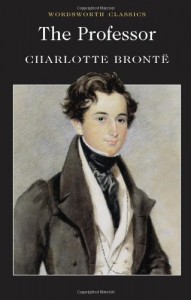Lagraziana's Kalliopeion
This is a blog about my reads as well as everything related to them.
My taste is for good quality literature - old and new. Some of it I review here or on my main book blog Edith's Miscellany.
A Teacher’s Struggle For Happiness: The Professor by Charlotte Brontë

To read the first work of a much adored writer can be either a revelation or more likely a deception, sometimes even a big one because not many succeed in producing outstanding literature already in the very first try. Writing like any other occupation needs practice. And experience of life usually isn’t a disadvantage, either. Quite a lot of the great men and women of literature that we know today saw their first novels (poems, short stories,…) rejected by publishers, often by more than just one, as show their biographies. In the Victorian age this wasn’t any different from today. Charlotte Brontë, for instance, never saw her first novel in print. The Professor was first published under her pen name Currer Bell in 1857, i.e. only two years after her premature death, and to this date it’s less widely read than her masterpieces Jane Eyre and Villette or even Shirley.
In fact, The Professor can’t compete with the literary quality of Charlotte Brontë’s later success novels although it shows already her extraordinary talent for storytelling and her liking for an action-driven, not to say melodramatic plot. Also the world that she describes in powerful images and with the sometimes annoying verbosity characteristic of her time is one that she knew well from own experience and that would be the setting of her more famous novels too: all her protagonists are in one way or another involved in teaching the children of the well-to-do, be it at their homes or in a school. For her first novel, however, the author chose the point of view not of a young woman and governess as would be expected, but of an orphaned young man – William Crimsworth – who received an elite education at Eton College thanks to the financial support of his aristocratic and condescending maternal uncles. William defies their wish for him to become a clergyman and sets out to follow in his late father’s footsteps as a tradesman accepting the petty job as a clerk that his much older brother Edward offers him in his mill business. Unfortunately, things don’t turn out as desired because Edward is a tyrannical boss and he is jealous of his brother’s good education. With the help of his unusual friend Hunsden Yorke Hunsden, William obtains a job as a teacher in a boys’ boarding school in Brussels, Belgium. His skill in class soon attracts the attention of the headmistress of the neighbouring girls’ boarding school, Mademoiselle Zoraïde Reuter, who offers him to give lessons to her students and to earn a small, though very welcome extra. What follows seem to me the typical tribulations of a Victorian romance without great depth. William gets a crush on Mlle Reuter who is charming and kind to him, but he contents himself with dreaming because he knows that he has neither the looks nor the financial means to win her. Moreover, he soon learns that she is engaged to his headmaster M. Pelet and from then on his behaviour to her becomes even more formal. It’s then that Mlle Reuter begins to really flirt with him and despite her she even falls a little in love. To make him come over to her school more often, she suggests that he gives English lessons to one of her young teachers. He accepts and passes much time with the half-Swiss, half-English girl called Frances Evans Henri who is orphaned like himself and shows extraordinary talent. Of course, teacher and student fall in love to the great dismay of Mlle Reuter who interferes at once. But this wouldn’t be a Victorian romance if their story ended so unhappily...
I agree with other reviewers that The Professor isn’t Charlotte Brontë’s best work, but the short novel certainly has its merits. As regards the plot, I actually prefer it to Jane Eyre because it’s a little less sentimental despite taking a turn from the coming-of-age story of a penniless and (almost) friendless young man who needs to make a living to a rather ordinary story of two lovers who have to cope with all kinds of difficulties. Maybe this is because the point of view is male. Overall, I enjoyed the read and can recommend it without bad conscience although it’s a Victorian novel including to a certain degree all that I don’t like about them.
The Professor - Charlotte Brontë,Sally Minogue
»»» read also my review of Agnes Grey by Anne Brontë on Edith’s Miscellany








